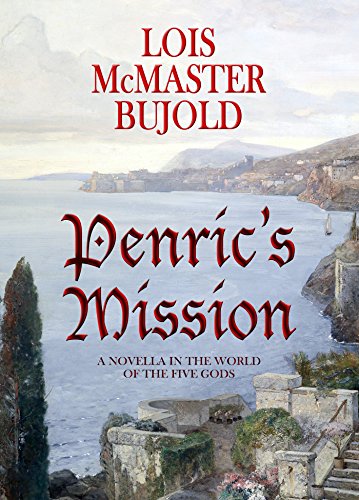 Penric's Mission (Penric and Desdemona #5) Formats available: ebook, audiobook
Penric's Mission (Penric and Desdemona #5) Formats available: ebook, audiobook Series: Penric and Desdemona #5
Pages: 145
on November 2nd 2016
Purchasing Info: Author's Website, Publisher's Website, Amazon, Barnes & Noble, Bookshop.org
Goodreads
In his thirtieth year, Penric fell in love with light…
Learned Penric, a sorcerer and divine of the Bastard’s Order, travels across the sea to sunlit Cedonia on his first covert diplomatic mission, to attempt to secure the services of a disaffected Cedonian general for the Duke of Adria. However, nothing is as it seems: Penric is betrayed and thrown into a dungeon, and worse follows for the general and his kin. Penric’s narrow escapes and adventures — including his interest in a young widow — are told with Bujold’s remarkable energy, wit and humor. Once again, Bujold has created unforgettable characters and a wondrous, often dangerous world of intrigue and sorcery.
My Review:
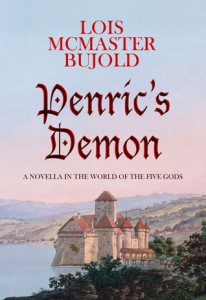 This third novella in Bujold’s Penric and Desdemona series, itself a spinoff of her World of the Five Gods series (A.K.A. Chalion) is just as much fun as the first two books, Penric’s Demon and Penric and the Shaman. If you are looking for a a deft fantasy that comes in a smaller than a doorstop package, Penric is a fascinating hero and this series is terrific.
This third novella in Bujold’s Penric and Desdemona series, itself a spinoff of her World of the Five Gods series (A.K.A. Chalion) is just as much fun as the first two books, Penric’s Demon and Penric and the Shaman. If you are looking for a a deft fantasy that comes in a smaller than a doorstop package, Penric is a fascinating hero and this series is terrific.
Penric is actually Learned Penric, a sorcerer and divine of the Lord Bastard, the “master of all disasters out of season. And Penric’s mission in this story, and quite often his life in general, seems to consist of one unexpected disaster after another. It makes for a very wild and entertaining ride.
Penric thinks that he’s on a mission to discover if one of Cedonia’s greatest generals is willing to move to Adria and take up work for the Duke there. He wouldn’t be turning his coat in any way, Cedonia and Adria are not currently enemies, he would just be switching employers.
But Adelis has more enemies than even he believed, and Penric is being used. Even more so than usual. His arrival in Cedonia is all part of someone else’s plan to frame Adelis for treason and get both of them out of the picture. What happens to Penric is just collateral damage. But no one knows what Penric really is, that particular lack of attention on the part of those who are now both of their enemies is going to result in a nasty shock for someone – hopefully a lot of someones.
First Penric has to get Adelis, his sister Nikys, and himself out of the hole that has inconveniently dug for them, by making things very, very inconvenient for someone else. And by doing something that has never been done before – curing the blindness that was cruelly thrust upon Adelis to get him out of the way and make him pay for the plots that he wasn’t even a part of.
Yet. But he certainly is now.
All Penric has to do is get them all out of the country even though Adelis doesn’t trust him at all. And Nikys has come to trust him entirely too much. And vice-versa.
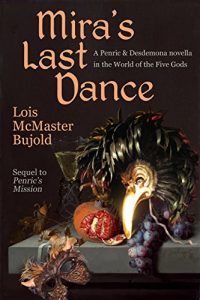 Escape Rating A: I loved the Chalion series, and this “extension” by Penric has been an absolutely treat from beginning to hopefully not end. The fourth book, Mira’s Last Dance, has just come out, and I truly hope this series continues.
Escape Rating A: I loved the Chalion series, and this “extension” by Penric has been an absolutely treat from beginning to hopefully not end. The fourth book, Mira’s Last Dance, has just come out, and I truly hope this series continues.
You really do need to read all of Penric to get the full flavor of Penric’s life with his demon Desdemona. While each book is short, they layer on one another, getting deeper and deeper into Penric’s life and the way the world works with each outing. However, you don’t need to read the Chalion series to love Penric. But it’s awesome epic fantasy, so why wouldn’t you?
The story revolves around Penric and his demon Desdemona. If you like Penric’s character, the series is awesome because Penric is a lot of fun. Although his official title is “Learned Penric”, he sometimes answers to “Learned Fool” and it’s a pretty accurate description. Penric is always the fool that rushes in where angels or other beings rightfully fear to tread. So far, he always gets himself out again, if only by the skin of his, or even Desdemona’s, teeth. And generally by spreading a lot of chaos in his wake, and onto the local populations of vermin of all types – occasionally including humans.
Penric is terrific at not taking himself too seriously most of the time, and then just taking himself seriously enough. And while magic often gets him out of the scrapes he gets himself into, it’s never killing magic. Penric is constrained by his faith and his care for Desdemona not to use his magic to kill. His theology is well-articulated and absolutely fascinating, and it does work. If he kills using his magic, Desdemona will be stripped from him and sent back to the chaos from which she sprang. She would die, he would be excommunicated, and let’s just say it would be bad juju all the way around. Listening to Penric explain all of this to the general Adelis gives the reader a whole lot of insight into how it all works – and when it doesn’t.
He actually likes Desdemona. Most of the time, he doesn’t mind sharing his head with her. Occasionally she’s like an older sister he can’t get rid of, but he appreciates her and her 200 years of experience and power. Theirs is a symbiosis that works well. And even though they share Penric’s body, both characters are clearly delineated and different.
The story, as all of Penric’s stories so far, are about Penric solving a problem that he never expected to be dropped into. In this case, he’s not only solving his problem, but also Adelis and Nikys’ problems as well. And falling in love. Where that’s going to take him next should be another great story. And it’s a good thing that the next story is already out, because this one doesn’t so much end as stop, leaving the reader breathless for what comes next.

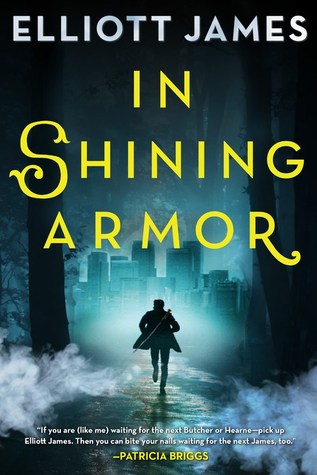 In Shining Armor (Pax Arcana, #4) by
In Shining Armor (Pax Arcana, #4) by  Actually, John Charming is a knight in rather tarnished and bloodstained armor. It also seems to be covered in slime and shit all-too-frequently. But he’s still a knight, even if he is also a werewolf. And based on his adventures in his first three books,
Actually, John Charming is a knight in rather tarnished and bloodstained armor. It also seems to be covered in slime and shit all-too-frequently. But he’s still a knight, even if he is also a werewolf. And based on his adventures in his first three books,  As someone who has read the entire series, I have to say that I really missed the gang that John and Sig created (or that grew around them) in the first three books. And I missed those people, and the feeling of family and friends that they developed. But even though In Shining Armor pulls them completely out of their trusted sphere, it is still very grounded in the world that has been created, to the point where I don’t think In Shining Armor is the best place for someone to start this series. The operation of the Knights Templar is very complicated, and seems to get more so all the time. So start with Charming.
As someone who has read the entire series, I have to say that I really missed the gang that John and Sig created (or that grew around them) in the first three books. And I missed those people, and the feeling of family and friends that they developed. But even though In Shining Armor pulls them completely out of their trusted sphere, it is still very grounded in the world that has been created, to the point where I don’t think In Shining Armor is the best place for someone to start this series. The operation of the Knights Templar is very complicated, and seems to get more so all the time. So start with Charming.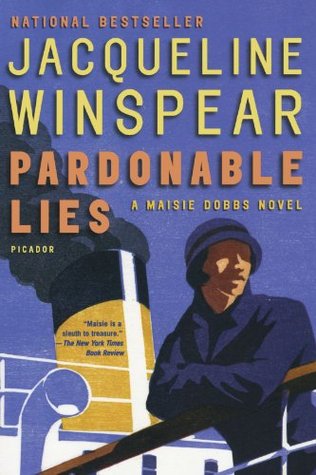 Pardonable Lies (Maisie Dobbs, #3) by
Pardonable Lies (Maisie Dobbs, #3) by 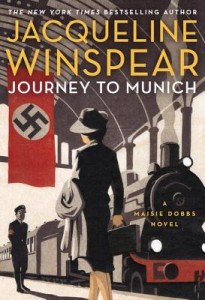 Escape Rating A: I always look forward to March and Maisie Month. It gives me a terrific excuse to dive into the archives of this series as well as look forward at the latest book. As always, the early book is a treat, as I get to discover where some of the later events took root.
Escape Rating A: I always look forward to March and Maisie Month. It gives me a terrific excuse to dive into the archives of this series as well as look forward at the latest book. As always, the early book is a treat, as I get to discover where some of the later events took root.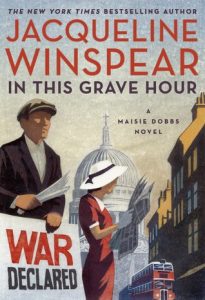 Only one case gets Maisie’s usual whole truth; the case of a young prostitute accused of murdering her pimp. The rush to justice on the part of the police, and their willingness to ignore any and all mitigating or contradictory evidence in order to punish this young woman makes readers see both how far we’ve come and how far we still have to go as a society. Only Maisie, is willing to believe that this woman might be innocent. And only Maisie is willing to delve into the truth to see that justice is actually done.
Only one case gets Maisie’s usual whole truth; the case of a young prostitute accused of murdering her pimp. The rush to justice on the part of the police, and their willingness to ignore any and all mitigating or contradictory evidence in order to punish this young woman makes readers see both how far we’ve come and how far we still have to go as a society. Only Maisie, is willing to believe that this woman might be innocent. And only Maisie is willing to delve into the truth to see that justice is actually done.
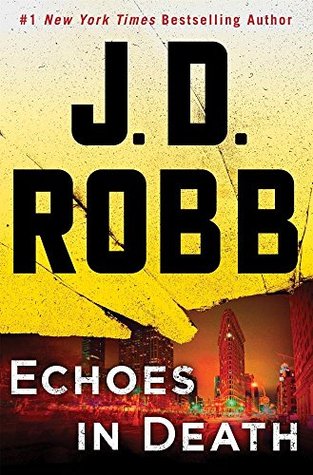 Echoes in Death (In Death, #44) by
Echoes in Death (In Death, #44) by 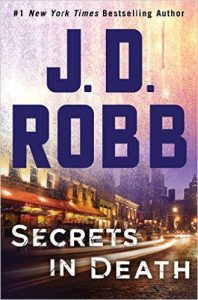 But this was one of their outings where I figured out who done it much, much too early. And once I knew who it had to be, a lot of the work of catching the sick bastard became anticlimactic. I did enjoy watching Eve bait him into a cage and kick the door shut behind him. Watching her wrap a suspect up in his own knots is always fun.
But this was one of their outings where I figured out who done it much, much too early. And once I knew who it had to be, a lot of the work of catching the sick bastard became anticlimactic. I did enjoy watching Eve bait him into a cage and kick the door shut behind him. Watching her wrap a suspect up in his own knots is always fun. Flying Too High (Phryne Fisher, #2) by
Flying Too High (Phryne Fisher, #2) by  As in
As in  Leonard: My Fifty-Year Friendship with a Remarkable Man by
Leonard: My Fifty-Year Friendship with a Remarkable Man by  To this reader, it felt as if the book, while purporting to tell the story of Leonard Nimoy’s life, ends up combining autobiography with biography. These two men knew each other very well for a very long time, came from somewhat similar backgrounds, and found themselves yoked together, whether they liked it or not (and sometimes they did and sometimes they didn’t) by their performances in what everyone expected would be a short-lived TV program.
To this reader, it felt as if the book, while purporting to tell the story of Leonard Nimoy’s life, ends up combining autobiography with biography. These two men knew each other very well for a very long time, came from somewhat similar backgrounds, and found themselves yoked together, whether they liked it or not (and sometimes they did and sometimes they didn’t) by their performances in what everyone expected would be a short-lived TV program. In the end, this is a book for the fans.It is way more about the history of Star Trek than any other single topic. As a fan, I found the story interesting and often charming. Perhaps I should say “fascinating” as Spock often did.
In the end, this is a book for the fans.It is way more about the history of Star Trek than any other single topic. As a fan, I found the story interesting and often charming. Perhaps I should say “fascinating” as Spock often did.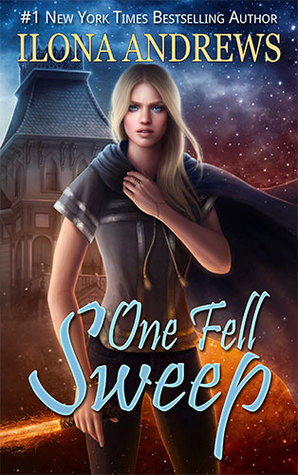 One Fell Sweep (Innkeeper Chronicles, #3) by
One Fell Sweep (Innkeeper Chronicles, #3) by  This one is all about family. The one you are born to, and the one that you make. With Dina stuck in the middle, trying to protect all of them. Not just because that’s her job, but because that’s who she is.
This one is all about family. The one you are born to, and the one that you make. With Dina stuck in the middle, trying to protect all of them. Not just because that’s her job, but because that’s who she is.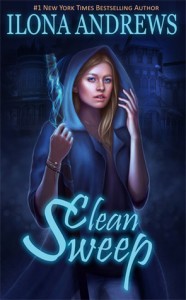 I have fallen in love with this series. I started
I have fallen in love with this series. I started  Sweep in Peace (Innkeeper Chronicles, #2) by
Sweep in Peace (Innkeeper Chronicles, #2) by 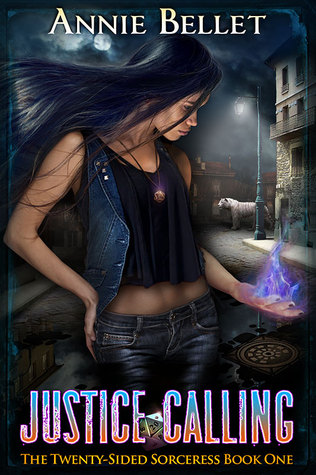 Justice Calling by
Justice Calling by  By the end of the story, the reader is invested in the characters and feels the emotional heft of Jade’s decision to stay and fight. The battle looks to be a long and bloody one.
By the end of the story, the reader is invested in the characters and feels the emotional heft of Jade’s decision to stay and fight. The battle looks to be a long and bloody one.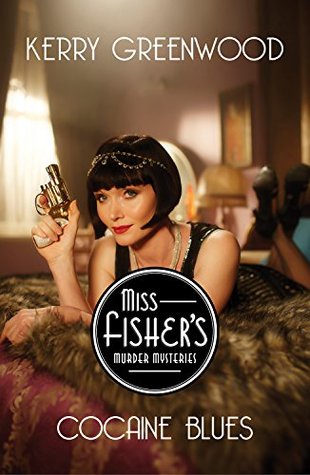 Cocaine Blues (Phryne Fisher, #1) by
Cocaine Blues (Phryne Fisher, #1) by 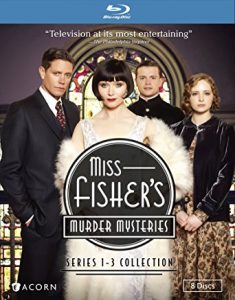 For those who have seen the series and wonder how the book matches the episode, this is one of the few times where the TV show actually is better. The plot is a bit tighter, and what are two loosely connected mysteries in the book become one single and stronger mystery in the episode.
For those who have seen the series and wonder how the book matches the episode, this is one of the few times where the TV show actually is better. The plot is a bit tighter, and what are two loosely connected mysteries in the book become one single and stronger mystery in the episode.